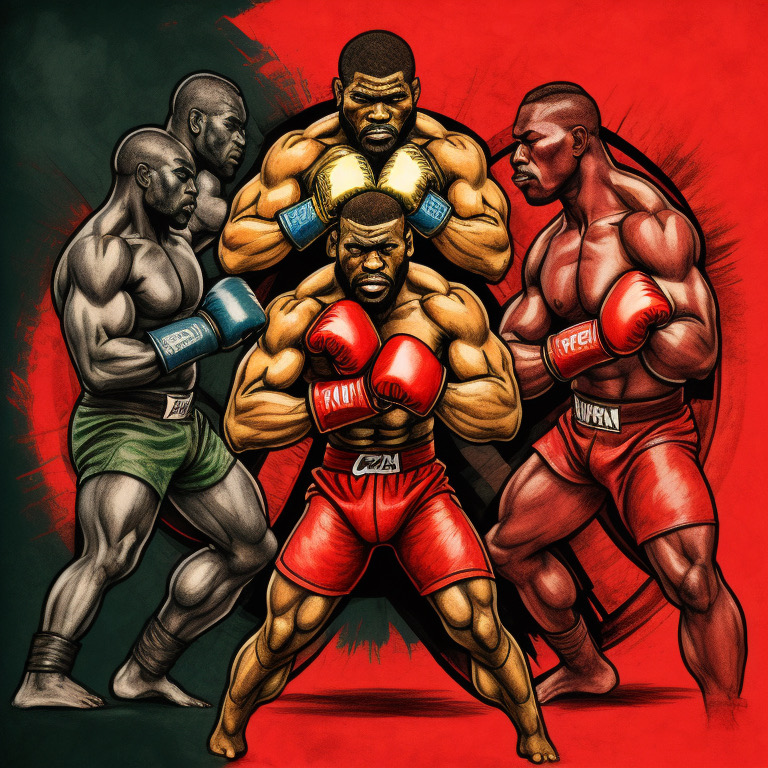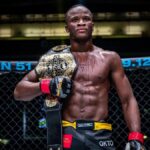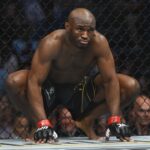Introduction
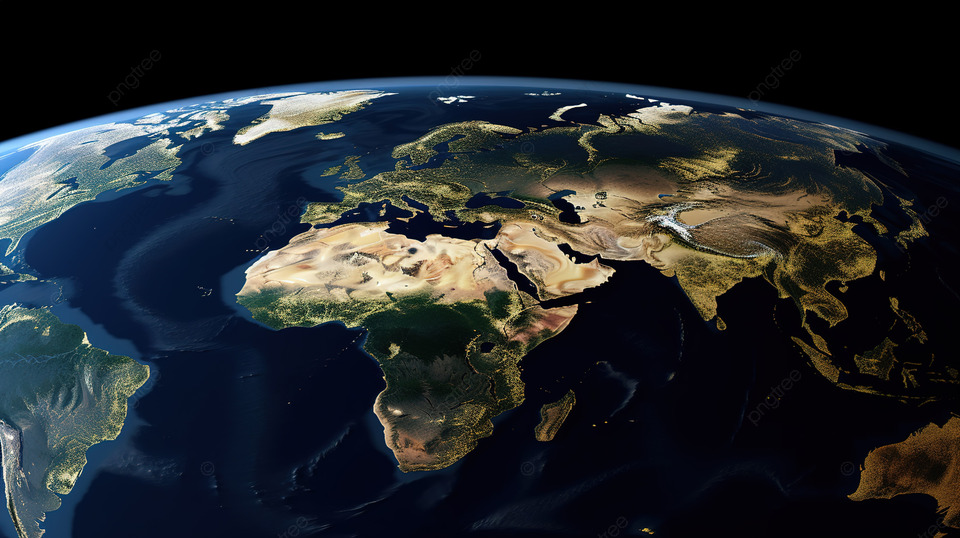
In the dynamic world of mixed martial arts, the anticipation for UFC Africa has been a sentiment lingering in the hearts of fans for quite some time. As we delve into the hypotheticals of the past, one can’t help but imagine the glorious picture painted by the prospect of a 2021 or 2022 event, where Kamaru Usman, Israel Adesanya, and Francis Ngannou could have stood tall as three African champions, basking in the shared limelight on their home continent.
Alas, logistical challenges and the aftermath of a global pandemic hindered this vision from becoming a reality. Yet, here we stand on the precipice of UFC Africa in 2024, where the echoes of missed opportunities are drowned out by the excitement that the event is finally set to unfold. While the trio of champions may have undergone changes, with Ngannou parting ways with the UFC in 2023, the enthusiasm remains palpable.
UFC Africa is not merely a showcase of athleticism; it symbolizes an unprecedented opportunity for African fighters in the UFC. This event is a stage set for them to shine under the bright lights, showcasing their skills and resilience on their home soil. It’s not just about the established names; it’s also about the new wave of African prospects, waiting eagerly to make their mark in the UFC.
In this article, we explore the potential countries that could play host to this historic event, the stadiums that stand as grand stages for this spectacle, and the faces – familiar and new – that may grace the octagon during UFC Africa. Join us as we unravel the excitement, prospects, and possibilities that UFC Africa holds for fighters and fans alike.
What countries can host the event for an historic night?
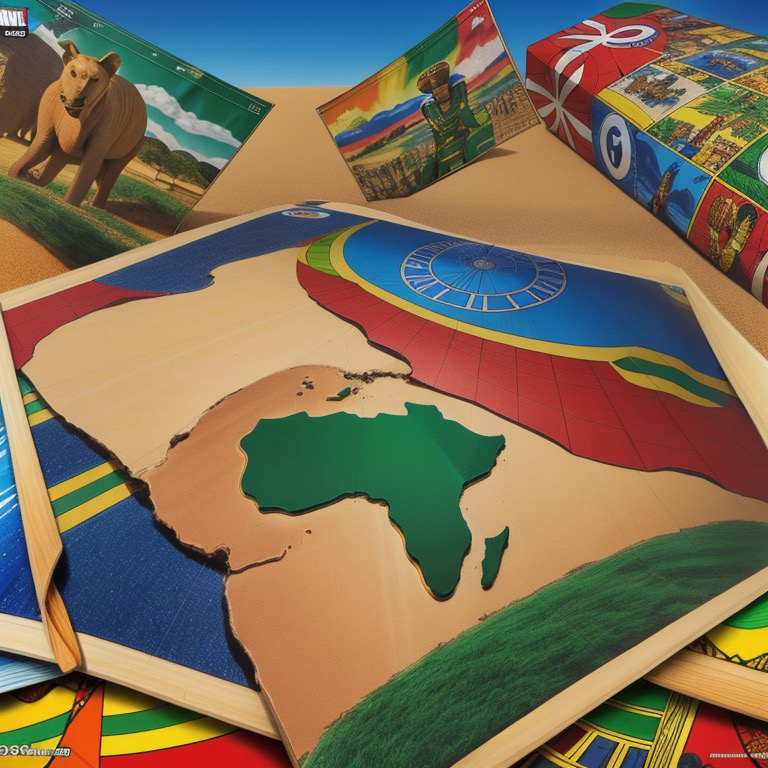
In the reverberating aftermath of UFC 296, Dana White has unveiled the potential hosts for the eagerly anticipated UFC Africa event. The canvas is expansive, with several African nations vying to be the backdrop for this historic spectacle.
South Africa
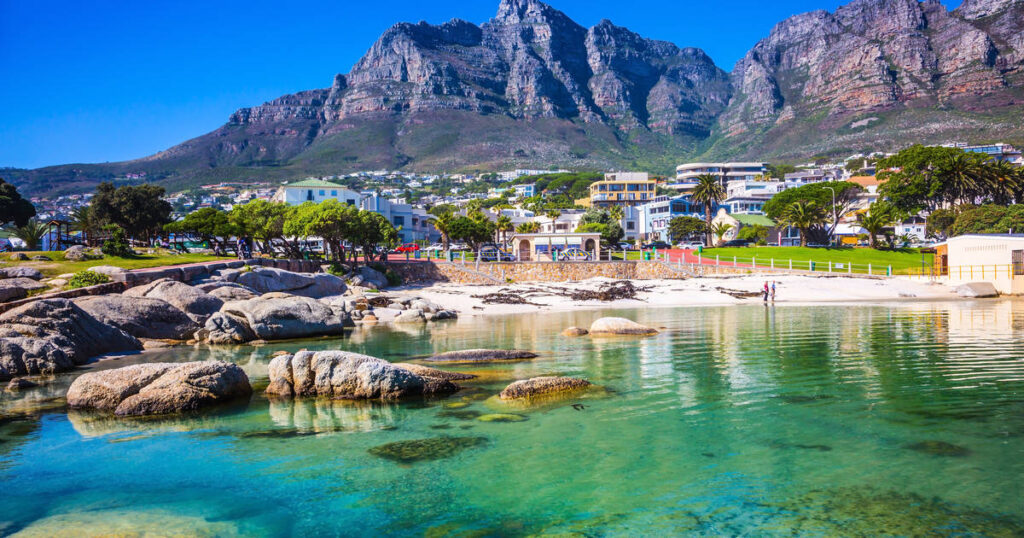
During the post-fight presser of UFC 296, Dana White expressed a cautious stance about South Africa as a potential host for UFC Africa. He cited a hesitation stemming from the perception that being in South Africa doesn’t necessarily evoke the quintessential African experience, given the notable Western influence in the country. However, a pivotal development emerged as South African fighter Dricus Du Plessis secured a bout against the American UFC Middleweight Champion Sean Strickland at UFC 297 in January 2024. Dana hinted that if Du Plessis triumphs and becomes the champion, there could be reconsideration for South Africa as the host country, providing an opportunity for Du Plessis to defend his belt on home soil. South Africa boasts a robust MMA culture, notably through the presence of the Extreme Fighting Championship (EFC), the most successful MMA organization in Africa, indicating the country’s familiarity and enthusiasm for hosting high-profile MMA events.
Nigeria
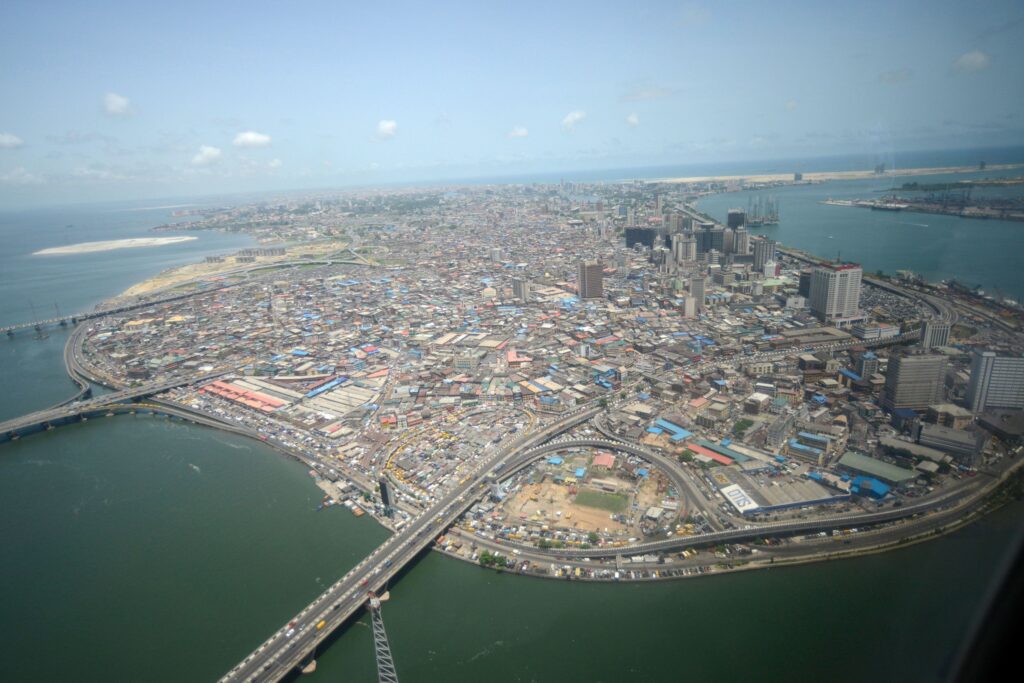
Nigeria, the home country of former UFC welterweight champion Kamaru Usman and former UFC middleweight champion Israel Adesanya, emerges as a strong contender. With sprawling cities like Lagos, Abuja, and Kano, along with a wealth of billionaires, big stadiums, and robust infrastructure, Nigeria becomes an even more compelling option. The UFC’s ambitious goal to cultivate young talents in Africa through programs like Road to UFC adds a layer of significance. The potential of hosting UFC Africa in Nigeria not only celebrates the champions but also kickstarts a developmental journey for future African MMA stars.
Rwanda

Rwanda enters the ring as a potential host, and the surprise lies in its uncharted territories within the MMA scene. With stability and a growing interest in combat sports, Rwanda presents a unique opportunity for the UFC to make its mark. The country’s commitment to progress and the arts could turn UFC Africa into a celebration of resilience and newfound sporting enthusiasm.
Senegal
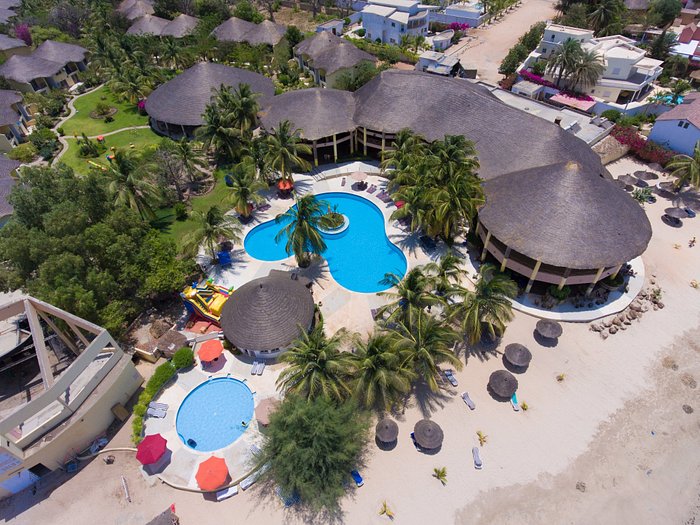
Dakar, Senegal, has already dipped its toes into the MMA scene by hosting Ares FC1. Beyond its infrastructure, the city offers a magical blend of culture and tourism. With attractions like the Island of Gorée and the Pink Lake, Senegal could provide fans from around the world with an unforgettable experience, making it a strong contender. Notably, Saly, the most touristical town in West Africa, adds another layer of allure to Senegal’s potential as a host.
Ivory Coast

Ivory Coast, with its pristine beaches and a plethora of tourist activities, stands as a potential jewel among other viable options for UFC Africa. While the UFC’s considerations may not be explicit, the country’s enchanting landscapes and vibrant culture hold promise for future MMA events. The UFC’s decision extends beyond the fight venue, aiming to create events that transcend the octagon, and Ivory Coast could become a cultural destination for the MMA world.
Congo

Congo, boasting some of Africa’s largest stadiums and a historical connection to the ‘Rumble in the Jungle,’ has a rich sporting legacy that positions it as another intriguing prospect among other viable options. Although the UFC’s current considerations may not include Congo for UFC Africa, its impressive infrastructure and historical significance in sports make it a compelling candidate for potential future events. The UFC’s acknowledgment of Congo speaks not only to its infrastructure but also to its historical significance in the world of sports.
Ghana
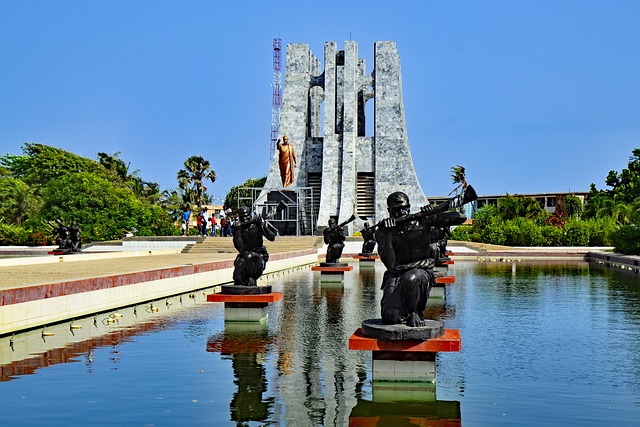
Ghana, a financially stable and English-speaking nation, brings its unique allure to the table as one of the other viable options. While it may not be in the current list of considerations for UFC Africa, Ghana’s potential as a host nation is worth exploring in the future. The UFC’s decision-making process aims to create events that transcend the octagon, celebrating the rich cultural tapestry of Ghana and providing a platform for potential African talents to shine in the world of MMA.
The Stadiums
Stade des Martyrs, Kinshasa, Congo
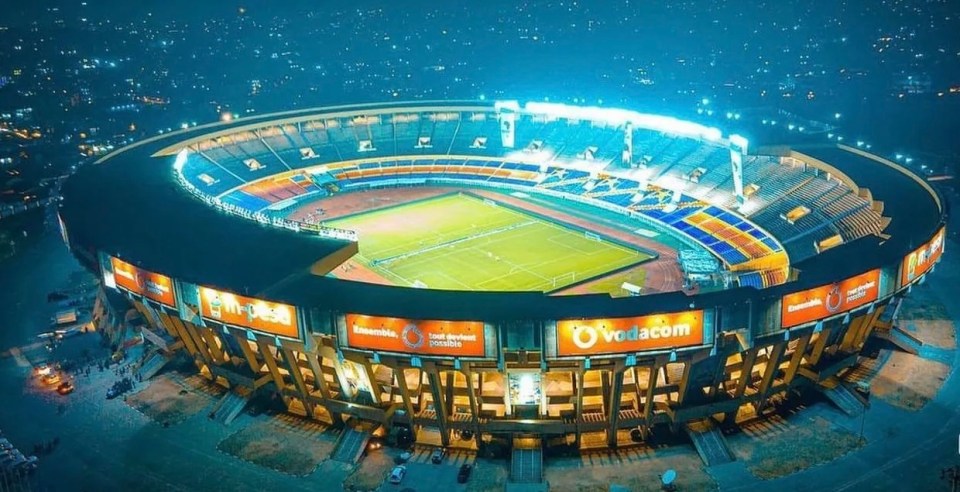
The Stade des Martyrs de la Pentecôte, situated in Kinshasa, Congo, stands as a colossal national stadium with a seating capacity of 80,000, making it the largest stadium in the Democratic Republic of the Congo and the fourth-largest in Africa. Widely used for football and serving as the home stadium for various teams, including the Congolese national football team, AS Vita Club, and DCMP, the Stade des Martyrs possesses the grandeur and capacity suitable for a significant event like UFC Africa. Its expansive facilities and rich sports history make it a compelling choice to host a spectacle that transcends traditional sporting boundaries.
Moshood Abiola National Stadium, Abuja, Nigeria
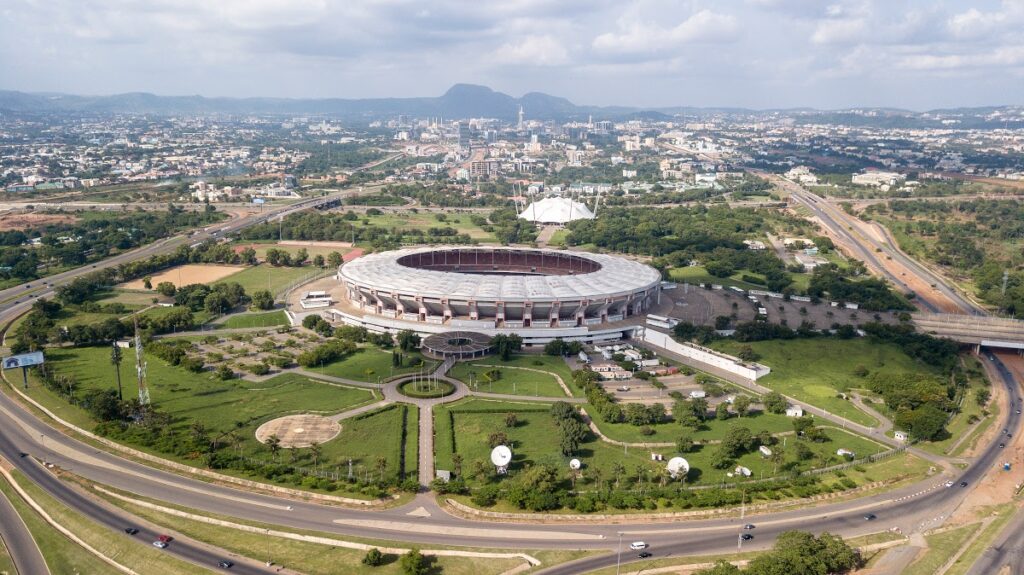
The Moshood Abiola National Stadium, located in Abuja, Nigeria, is a multipurpose national sports stadium with a significant history, having hosted the 8th All Africa Games in 2003. Renamed in honor of former Nigerian politician Chief M.K.O Abiola, the stadium is a versatile venue for various events, including social, cultural, and religious gatherings. Its strategic location in the Federal Capital Territory and its historical significance make it a potential contender for UFC Africa. The stadium’s expansive construction and modern facilities align with the vision of hosting a prestigious international event, bringing the world of MMA to Nigeria’s doorstep.
Alassane Ouattara Stadium, Abidjan, Ivory Coast
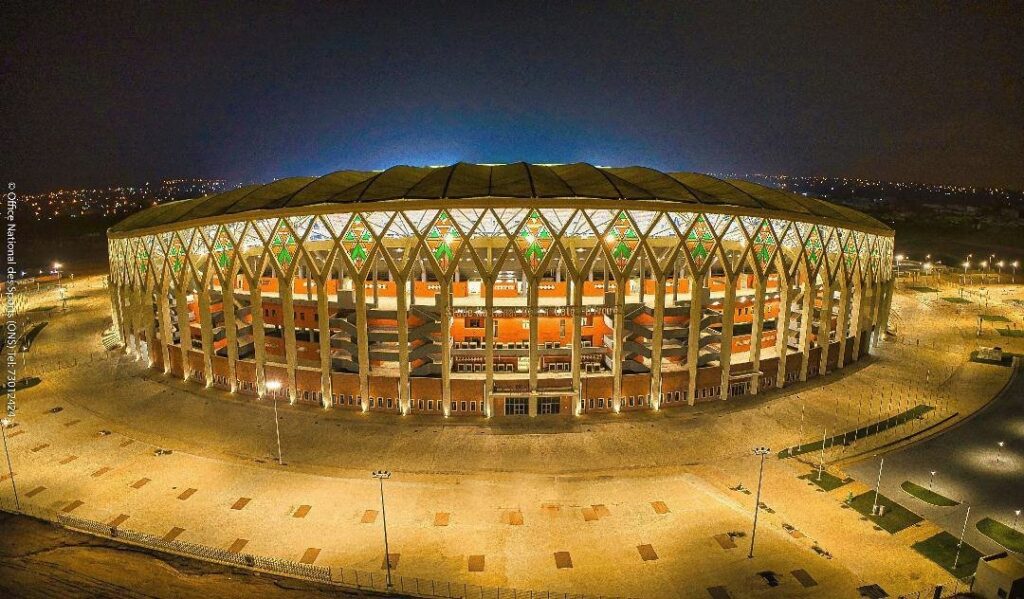
Alassane Ouattara Stadium, also known as the Olympic Stadium of Ebimpé, emerges as a modern marvel in Ivory Coast, boasting 60,000 seats and inaugurated in 2020. While initially designed for the 2021 Africa Cup of Nations, the stadium’s construction faced delays, leading to a relocation of the tournament. Despite this, the stadium’s state-of-the-art facilities and strategic location, positioned as part of a vast sports city, make it an attractive option for hosting UFC Africa in the future. The stadium’s potential to become a sports and leisure hub in Africa positions it as one of the promising venues for showcasing MMA on the continent.
Cape Town Stadium, Cape Town, South Africa
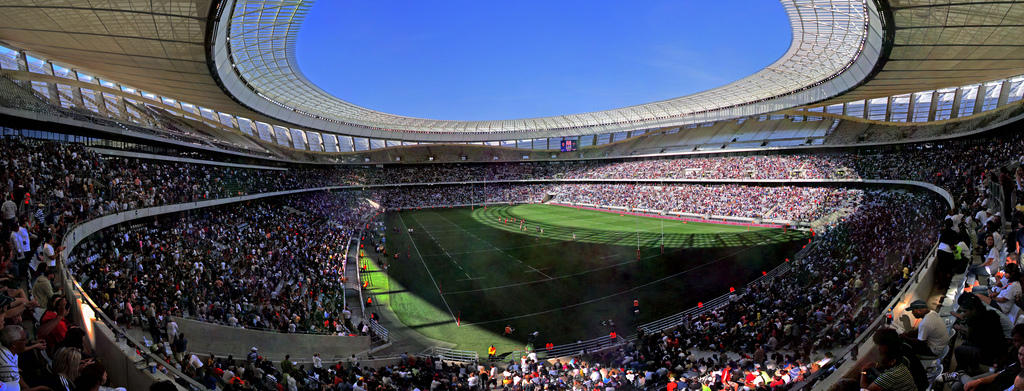
The Cape Town Stadium, a prominent fixture in South Africa, was built for the 2010 FIFA World Cup and serves as the home ground for WP Rugby, the DHL Stormers, and Premier Soccer League clubs Cape Town Spurs and Cape Town City. With a seating capacity of 58,309, the stadium stands as the 5th biggest in South Africa. Its strategic location between Signal Hill and the Atlantic Ocean, coupled with its experience in hosting international events like the Rugby 7s World Cup, positions it as an ideal venue for UFC Africa. The Cape Town Stadium promises a stunning backdrop for a night of thrilling MMA action.
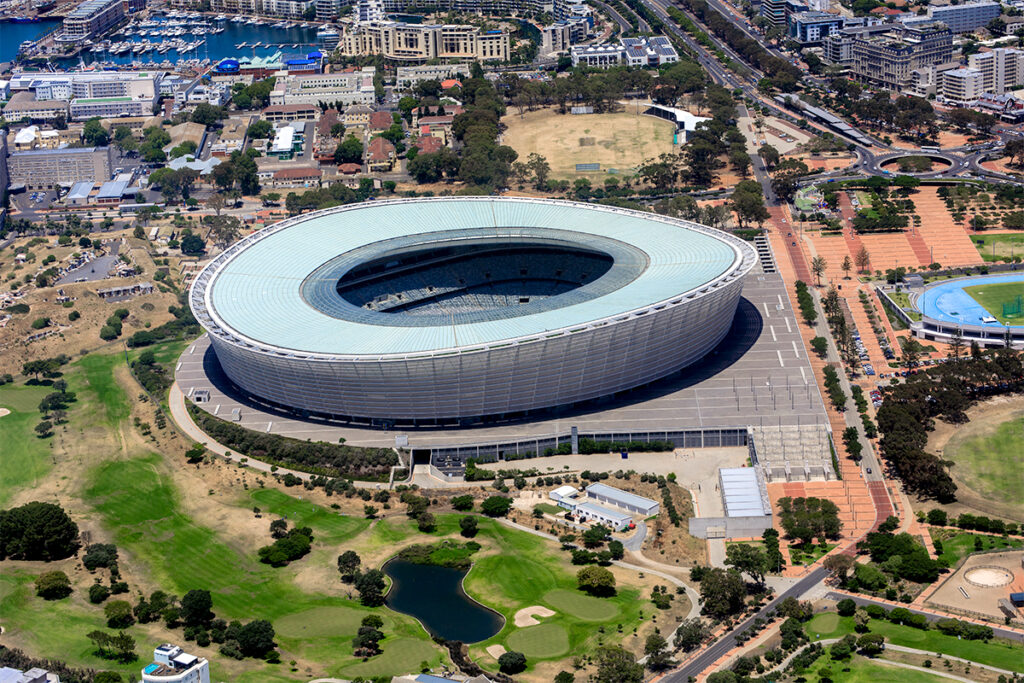
Accra Sports Stadium, Accra, Ghana
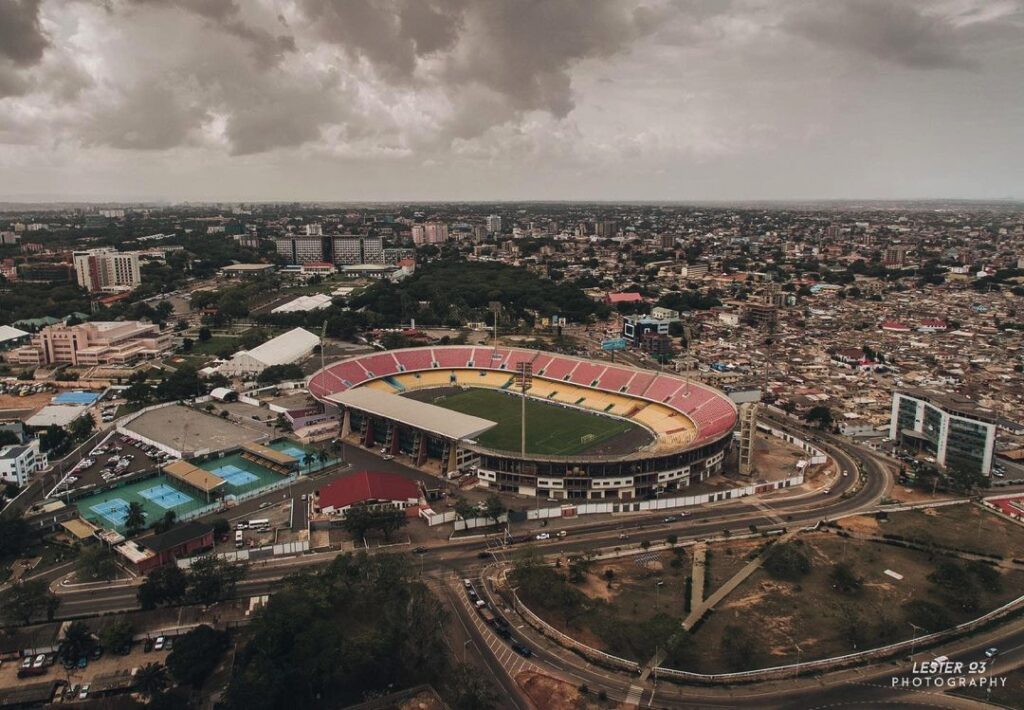
The Accra Sports Stadium, located in Accra, Ghana, boasts a rich history dating back to its inauguration in 1962. Renamed after Ohene Djan, the country’s first Director of Sports, the stadium underwent renovations to meet FIFA standards for the 2008 African Cup of Nations. With a capacity of 40,000, the stadium has been a host for various football and rugby matches, as well as professional boxing events. While it has not been explicitly mentioned for UFC Africa, the Accra Sports Stadium’s versatility and historical significance make it a potential contender among other viable options for showcasing MMA in Ghana.
Léopold Sédar Senghor Stadium, Dakar, Senegal

The Léopold Sédar Senghor Stadium, formerly known as the Stade de l’Amitie, stands as a multi-purpose stadium in Dakar, Senegal, with a seating capacity of 80,000. Serving as the home ground for ASC Jeanne d’Arc and the Senegal national football team, the stadium has a rich history of hosting major events, including the final match of the 1992 African Cup of Nations. While not explicitly stated for UFC Africa, its expansive facilities and past international events make it a plausible contender among other viable options. The stadium’s role in both sports and cultural events positions it as a potential stage for the excitement of MMA on the African continent.
UFC fighters, prospects, and African newcomers
UFC Africa is gearing up to potentially showcase a roster of formidable African fighters, promising a night of electrifying matchups and potential redemption stories. Two names that could loom large are Kamaru Usman, the former welterweight champion, and Israel Adesanya, the former middleweight champion. Usman, known as the Nigerian Nightmare, is poised to bounce back after a close split decision loss at UFC 294, hungry to reclaim his throne. Adesanya, the Last Stylebender, could bring an intriguing narrative to the event as he seeks potential redemption following the loss of his title to Sean Strickland. The potential clash between Adesanya and Dricus Du Plessis, fueled by genuine animosity, could promise a massive showdown on the African continent. This heated rivalry could add an extra layer of excitement to the event, turning UFC Africa into a stage for potential fierce competition and redemption stories for these iconic African fighters.
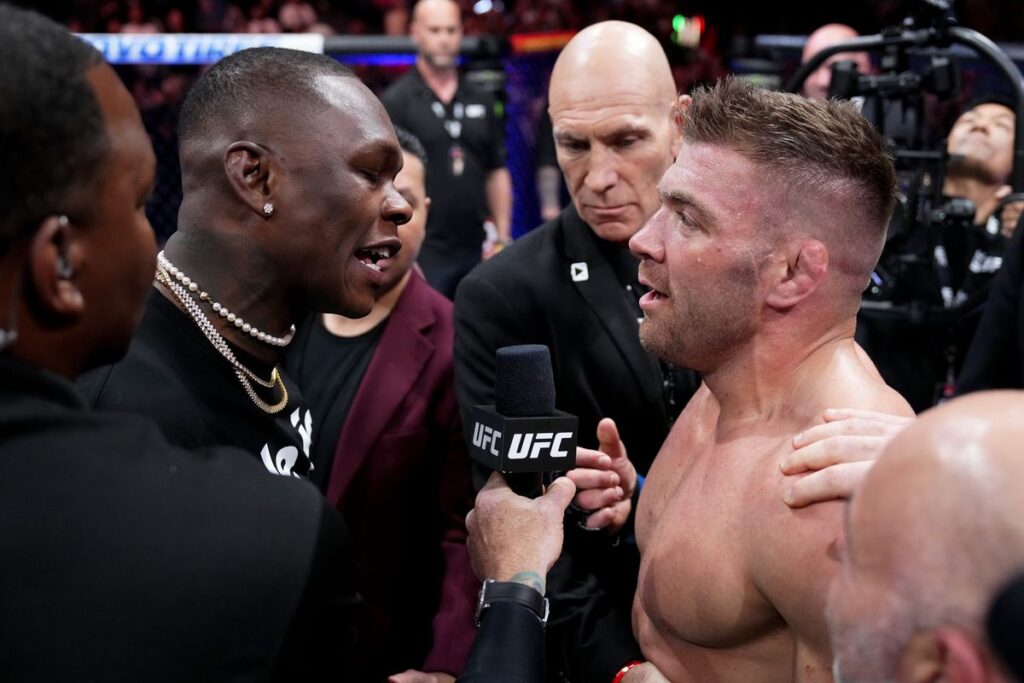
Adding to the mix is the Ugandan powerhouse David Onama, potentially riding high on a win streak, and the Congolese-English striker Marc Diakiese, both potentially ready to showcase their explosive skills. The dynamic Moroccan devil, Youssef Zalal, could be set to inject boundless energy into the featherweight division, while the flyweight division features the relentless Manel Kape eyeing a potential title shot after an impressive win streak. The presence of potential contenders like the Azaitar brothers, Kennedy Nzechukwu, Mounir Lazzez, and Abdul Razak Alhassan could set the stage for a night of thrilling matchups.
In the realm of rising talents, UFC Africa could potentially witness the debut of prospects like Igeu Kabesa, the EFC featherweight champion dubbed the strongest and most popular MMA featherweight in Africa. Demarte Pena, Ares FC bantamweight champion, and the Ivorian sensation Youssouf Binaté could also potentially be set to make their mark on the international stage. Brave CF bantamweight contenders Nicholas Hwende from Zimbabwe and Nkosi Ndebele, the South African champion, could add depth to the event, potentially creating an atmosphere of excitement and anticipation. As these African fighters could potentially converge on the continent’s stage, UFC Africa is poised to potentially become a celebration of skill, passion, and the thriving spirit of MMA in Africa.
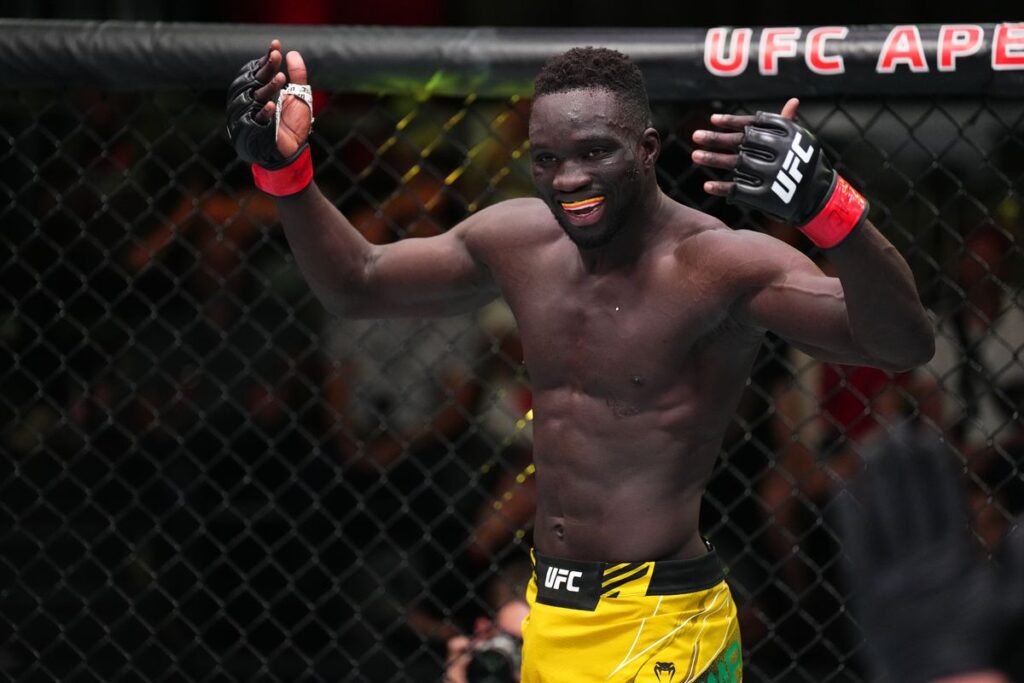
As the curtain rises on UFC Africa, the echoes of anticipation reverberate through the hearts of fans worldwide. The dream of witnessing African champions on their home soil has lingered for years, and now, the moment is near.
In this historic event, the octagon becomes a canvas for narratives, redemption stories, and the thrilling emergence of new talents. From the bustling cities of South Africa to the picturesque landscapes of Ivory Coast, potential host countries add their unique flair to the grand spectacle.
The lineup of fighters, a mix of seasoned champions and rising stars, promises an unforgettable night of MMA. Whether it’s the redemption journey of Kamaru Usman, the Last Stylebender’s potential resurgence, or the debut of Africa’s strongest featherweight, UFC Africa is set to be an electrifying celebration of skill, passion, and the indomitable spirit of African MMA.
As the countdown ticks away, fans brace themselves for a night that transcends sport, marking a historic chapter in the annals of mixed martial arts. UFC Africa – where the continent’s heartbeat pulses through every punch, kick, and roar of the crowd. Get ready for a night of unparalleled excitement and the making of MMA history.
UFC Africa 2024
Introduction

Dans le monde dynamique des arts martiaux mixtes, l’attente de UFC Africa est un sentiment qui persiste dans le cœur des fans depuis un certain temps. En explorant les hypothèses du passé, on ne peut s’empêcher d’imaginer l’image glorieuse que pourrait avoir présentée un événement en 2021 ou 2022, où Kamaru Usman, Israel Adesanya et Francis Ngannou auraient pu se tenir fièrement en tant que trois champions africains, baignant dans une lumière partagée sur leur continent d’origine.
Hélas, des défis logistiques et les conséquences d’une pandémie mondiale ont empêché cette vision de devenir réalité. Cependant, nous voici au seuil de UFC Africa en 2024, où les échos des opportunités manquées sont couverts par l’excitation dû au fait que l’événement est enfin prêt à se dérouler. Bien que le trio de champions ait pu changer, avec le départ de Ngannou de l’UFC en 2023, l’enthousiasme demeure palpable.
UFC Africa n’est pas simplement une vitrine de l’athlétisme ; il symbolise une opportunité sans précédent pour les combattants africains de l’UFC. Cet événement est une scène pour qu’ils brillent sous les feux des projecteurs, montrant leurs compétences et leur résilience sur leur propre sol. Il ne s’agit pas seulement des noms établis ; c’est aussi la nouvelle vague de jeunes espoirs africains qui attendent avec impatience de marquer leur empreinte à l’UFC.
Dans cet article, nous explorerons les pays potentiels qui pourraient accueillir cet événement historique, les stades qui se dressent comme des scènes grandioses pour ce spectacle, et les visages – familiers et nouveaux – qui pourraient fouler l’octogone lors de UFC Africa. Rejoignez-nous pour dévoiler l’excitation, les perspectives et les possibilités que UFC Africa offre aux combattants et aux fans.
Quels pays peuvent accueillir cet événement historique?

Dans le sillage résonnant de l’UFC 296, Dana White a dévoilé les hôtes potentiels pour l’attendu UFC Africa. La toile est vaste, avec plusieurs nations africaines rivalisant pour être le cadre de ce spectacle historique.
Afrique du Sud

Lors de la conférence de presse après l’UFC 296, Dana White a exprimé une position prudente quant à l’Afrique du Sud en tant qu’hôte potentiel pour UFC Africa. Il a évoqué une hésitation découlant de la perception que se trouver en Afrique du Sud n’évoque pas nécessairement l’expérience africaine quintessentielle, compte tenu de l’influence notable de l’Occident dans le pays. Cependant, un développement crucial est survenu lorsque le combattant sud-africain Dricus Du Plessis a obtenu un combat contre le champion américain des poids moyens de l’UFC, Sean Strickland, à l’UFC 297 en janvier 2024. Dana a laissé entendre que si Du Plessis l’emporte et devient champion, il pourrait y avoir une réévaluation de l’Afrique du Sud en tant que pays hôte, offrant ainsi à Du Plessis l’opportunité de défendre sa ceinture sur son sol natal. L’Afrique du Sud bénéficie d’une culture robuste du MMA, notamment avec la présence de l’Extreme Fighting Championship (EFC), l’organisation de MMA la plus réussie en Afrique, indiquant la familiarité et l’enthousiasme du pays pour accueillir des événements de MMA de haut niveau.
Nigeria

Le Nigeria, pays d’origine de l’ancien champion des poids mi-moyens de l’UFC Kamaru Usman et de l’ancien champion des poids moyens Israel Adesanya, émerge comme un candidat solide. Avec des villes étendues comme Lagos, Abuja et Kano, ainsi qu’une multitude de milliardaires, de grands stades et une infrastructure solide, le Nigeria devient une option encore plus convaincante. L’objectif ambitieux de l’UFC de cultiver de jeunes talents en Afrique grâce à des programmes comme “Road to UFC” ajoute une couche de signification. La possibilité d’accueillir UFC Africa au Nigeria célèbrerait non seulement les champions, mais lancerait également un parcours de développement pour les futures stars du MMA africain.
Rwanda

Le Rwanda entre dans l’arène en tant qu’hôte potentiel, et la surprise réside dans ses territoires inexplorés dans la scène du MMA. Avec la stabilité et un intérêt croissant pour les sports de combat, le Rwanda présente une opportunité unique pour l’UFC de marquer son empreinte. L’engagement du pays envers le progrès et les arts pourrait transformer UFC Africa en une célébration de la résilience et d’un enthousiasme sportif renouvelé.
Sénégal

Dakar, au Sénégal, a déjà plongé dans la scène du MMA en accueillant l’Ares FC 1. Au-delà de son infrastructure, la ville offre un mélange magique de culture et de tourisme. Avec des attractions comme l’Île de Gorée et le lac Rose, le Sénégal pourrait offrir aux fans du monde entier une expérience inoubliable, en faisant ainsi un sérieux prétendant. Notamment, Saly, la ville la plus touristique d’Afrique de l’Ouest, ajoute une autre couche de charme au potentiel du Sénégal en tant qu’hôte.
Côte d’Ivoire

La Côte d’Ivoire, avec ses plages immaculées et une pléthore d’activités touristiques, se positionne comme un joyau potentiel parmi d’autres options viables pour UFC Africa. Bien que les considérations de l’UFC ne soient peut-être pas explicites, les paysages enchanteurs et la culture vibrante du pays offrent des perspectives prometteuses pour des événements futurs de MMA. La décision de l’UFC va au-delà du lieu du combat, visant à créer des événements qui transcendent l’octogone, et la Côte d’Ivoire pourrait devenir une destination culturelle pour le monde du MMA.
Congo

Le Congo, avec certains des plus grands stades d’Afrique et une connexion historique avec le ‘Rumble in the Jungle’, possède un riche héritage sportif qui en fait une perspective intrigante parmi d’autres options viables. Bien que les considérations actuelles de l’UFC ne puissent inclure le Congo pour UFC Africa, son infrastructure impressionnante et son importance historique dans le monde du sport en font un candidat convaincant pour d’éventuels événements futurs. La reconnaissance de l’UFC envers le Congo témoigne non seulement de son infrastructure, mais aussi de sa signification historique dans le monde du sport.
Ghana

Le Ghana, nation financièrement stable et anglophone, apporte son attrait unique à la table en tant qu’une des options viables. Bien qu’il ne figure peut-être pas actuellement dans la liste des considérations pour UFC Africa, le potentiel du Ghana en tant que pays hôte mérite d’être exploré à l’avenir. Le processus décisionnel de l’UFC vise à créer des événements qui transcendent l’octogone, célébrant la riche diversité culturelle du Ghana et offrant une plateforme aux talents potentiels africains pour briller dans le monde du MMA.
Les Stades
Stade des Martyrs, Kinshasa, Congo

Le Stade des Martyrs de la Pentecôte, situé à Kinshasa, Congo, se présente comme un colossal stade national avec une capacité de 80 000 places, en faisant le plus grand stade de la République démocratique du Congo et le quatrième plus grand d’Afrique. Utilisé largement pour le football et servant de stade à diverses équipes, dont l’équipe nationale de football congolaise, l’AS Vita Club et le DCMP, le Stade des Martyrs possède la grandeur et la capacité adaptées à un événement significatif tel que UFC Africa. Ses installations étendues et son riche passé sportif en font un choix convaincant pour accueillir un spectacle qui transcende les frontières sportives traditionnelles.
Stade national Moshood Abiola, Abuja, Nigeria

Le Stade national Moshood Abiola, situé à Abuja, Nigeria, est un stade national polyvalent avec une histoire significative, ayant accueilli les 8e Jeux africains en 2003. Rebaptisé en l’honneur de l’ancien homme politique nigérian Chief M.K.O Abiola, le stade est un lieu polyvalent pour divers événements, y compris des rassemblements sociaux, culturels et religieux. Sa situation stratégique dans le Territoire de la capitale fédérale et son importance historique en font un prétendant potentiel pour UFC Africa. La construction étendue du stade et ses installations modernes s’alignent avec la vision d’accueillir un événement international prestigieux, amenant le monde du MMA au seuil du Nigeria.
Stade Alassane Ouattara, Abidjan, Côte d’Ivoire

Le Stade Alassane Ouattara, également connu sous le nom de Stade olympique d’Ebimpé, émerge comme une merveille moderne en Côte d’Ivoire, avec ses 60 000 places inaugurées en 2020. Bien qu’il ait été initialement conçu pour la Coupe d’Afrique des Nations de 2021, des retards dans la construction ont conduit à un déplacement du tournoi. Malgré cela, les installations ultramodernes du stade et sa situation stratégique, faisant partie d’une vaste cité sportive, en font une option attrayante pour accueillir UFC Africa à l’avenir. Le potentiel du stade à devenir un pôle sportif et de loisirs en Afrique le positionne comme l’un des sites prometteurs pour mettre en valeur le MMA sur le continent.
Stade du Cap, Le Cap, Afrique du Sud
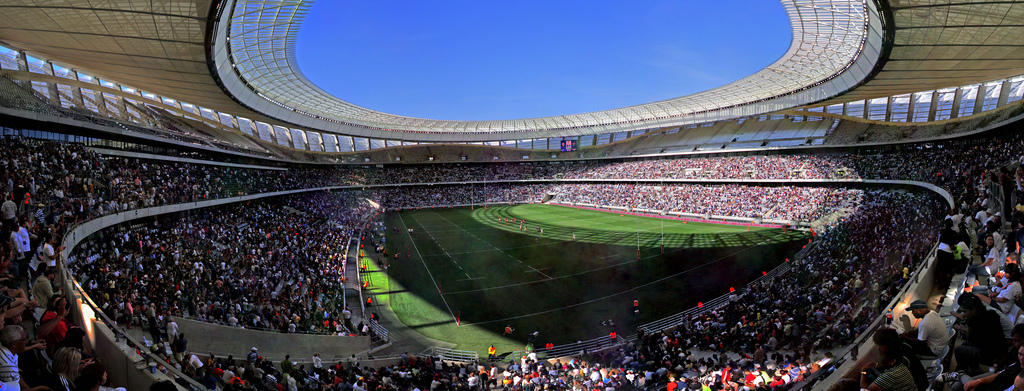
Le Stade du Cap, une institution en Afrique du Sud, a été construit pour la Coupe du Monde de la FIFA en 2010 et sert de terrain d’entraînement pour le rugby WP, les DHL Stormers et les clubs de la Premier Soccer League Cape Town Spurs et Cape Town City. Avec une capacité de 58 309 places, le stade est le cinquième plus grand d’Afrique du Sud. Sa situation stratégique entre Signal Hill et l’océan Atlantique, associée à son expérience dans l’organisation d’événements internationaux tels que la Coupe du Monde de Rugby 7, le positionne comme un lieu idéal pour UFC Africa. Le Stade du Cap promet un cadre magnifique pour une nuit d’action palpitante de MMA.

Stade des Sports d’Accra, Accra, Ghana

Le Stade des Sports d’Accra, situé à Accra, au Ghana, possède une histoire riche remontant à son inauguration en 1962. Renommé d’après Ohene Djan, le premier directeur des sports du pays, le stade a subi des rénovations pour répondre aux normes de la FIFA pour la Coupe d’Afrique des Nations de 2008. Avec une capacité de 40 000 places, le stade a accueilli divers matchs de football et de rugby, ainsi que des événements de boxe professionnelle. Bien qu’il n’ait pas été explicitement mentionné pour UFC Africa, la polyvalence du Stade des Sports d’Accra et sa signification historique en font un prétendant potentiel parmi d’autres options viables pour mettre en valeur le MMA au Ghana.
Stade Léopold Sédar Senghor, Dakar, Sénégal

Le Stade Léopold Sédar Senghor, anciennement connu sous le nom de Stade de l’Amitié, est un stade polyvalent situé à Dakar, au Sénégal, avec une capacité de 80 000 places. Servant de terrain de jeu pour l’ASC Jeanne d’Arc et l’équipe nationale de football du Sénégal, le stade a une riche histoire d’accueil d’événements majeurs, dont le match final de la Coupe d’Afrique des Nations de 1992. Bien qu’il ne soit pas explicitement mentionné pour UFC Africa, ses installations étendues et ses événements internationaux passés en font un prétendant plausible parmi d’autres options viables. Le rôle du stade dans les événements sportifs et culturels le positionne comme une scène potentielle pour l’excitation du MMA sur le continent africain.
Combattants, espoirs et nouveaux venus africains de l’UFC
UFC Africa se prépare à potentiellement présenter une liste de redoutables combattants africains, promettant une nuit de combats électrisants et d’histoires de rédemption potentielles. Deux noms qui pourraient se profiler en grand sont Kamaru Usman, l’ancien champion des poids mi-moyens, et Israel Adesanya, l’ancien champion des poids moyens. Usman, surnommé le Cauchemar Nigérian, est sur le point de rebondir après une défaite par décision partagée serrée à l’UFC 294, affamé de reconquérir son trône. Adesanya, the last Stylebender, pourrait apporter une narration intrigante à l’événement alors qu’il cherche une possible rédemption après la perte de son titre face à Sean Strickland. Le potentiel affrontement entre Adesanya et Dricus Du Plessis, alimenté par une animosité réelle, pourrait promettre un affrontement massif sur le continent africain. Cette rivalité tendue pourrait ajouter une couche supplémentaire d’excitation à l’événement, transformant UFC Africa en une scène de compétition acharnée et d’histoires de rédemption pour ces combattants africains emblématiques.

S’ajoutent à la liste la puissance ougandaise de David Onama, potentiellement porté par une série de victoires, et le frappeur congolais-anglais Marc Diakiese, prêt à montrer ses compétences explosives. Le dynamique diable marocain, Youssef Zalal, pourrait être prêt à injecter une énergie débordante dans la division des poids plumes, tandis que la division des poids mouches met en vedette le redoutable Manel Kape, cherchant une opportunité de titre après une impressionnante série de victoires. La présence de prétendants potentiels tels que les frères Azaitar, Kennedy Nzechukwu, Mounir Lazzez et Abdul Razak Alhassan pourrait préparer le terrain pour une nuit de combats palpitants.
Dans le domaine des talents émergents, UFC Africa pourrait potentiellement voir le début de prospects tels que Igeu Kabesa, le champion poids plumes de l’EFC surnommé le poids plume le plus fort et le plus populaire d’Afrique. Demarte Pena, champion poids coq de l’Ares FC, et la sensation ivoirienne Youssouf Binaté pourraient eux aussi être prêts à laisser leur empreinte sur la scène internationale. Les prétendants poids coq de Brave CF, Nicholas Hwende du Zimbabwe et Nkosi Ndebele, le champion sud-africain, pourraient ajouter de la profondeur à l’événement, créant potentiellement une atmosphère d’excitation et d’anticipation. Alors que ces combattants africains pourraient converger sur la scène du continent, UFC Africa est prêt à devenir une célébration des compétences, de la passion et de l’esprit florissant du MMA en Afrique.

Alors que le rideau se lève sur UFC Africa, les échos de l’anticipation résonnent dans le cœur des fans du monde entier. Le rêve de voir des champions africains sur leur propre sol persiste depuis des années, et maintenant, le moment est proche.
Dans cet événement historique, l’octogone devient une toile pour des récits, des histoires de rédemption et l’émergence palpitante de nouveaux talents. Des villes animées d’Afrique du Sud aux paysages pittoresques de la Côte d’Ivoire, les pays hôtes potentiels ajoutent leur touche unique au grand spectacle.
La liste de combattants, un mélange de champions chevronnés et d’étoiles montantes, promet une nuit inoubliable de MMA. Que ce soit le parcours de rédemption de Kamaru Usman, la résurgence potentielle du Last Stylebender, ou le début du poids plume le plus fort d’Afrique, UFC Africa est prêt à être une célébration électrisante des compétences, de la passion et de l’esprit indomptable du MMA africain.
À mesure que le compte à rebours s’égrène, les fans se préparent à une nuit qui transcende le sport, marquant un chapitre historique dans les annales des arts martiaux mixtes. UFC Africa – où le pouls du continent résonne à travers chaque coup, chaque coup de pied et chaque rugissement de la foule. Préparez-vous pour une nuit d’excitation inégalée et la création de l’histoire du MMA.

